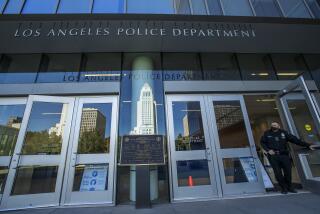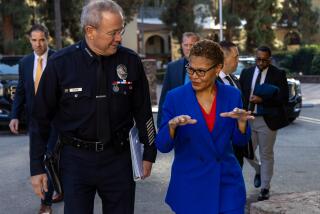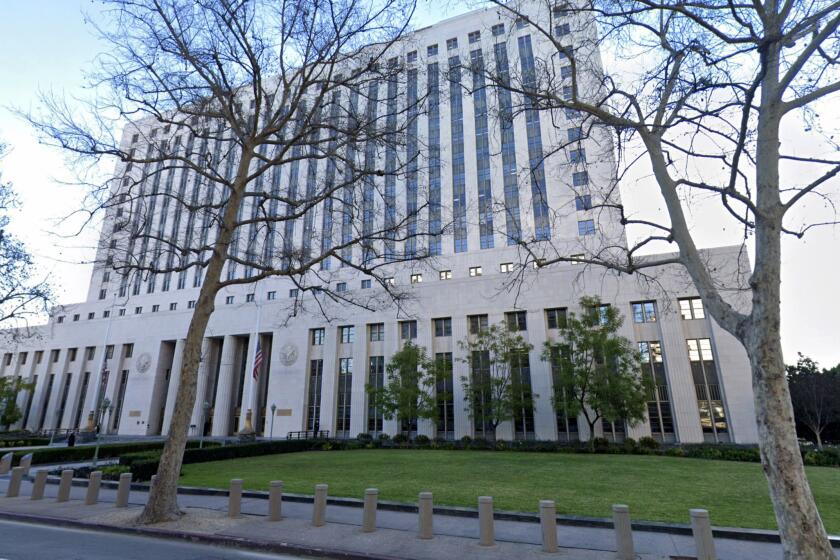Police Panel Forced to Sort Out Feud
Escalating an already rancorous feud, Dist. Atty. Gil Garcetti said his office today will present evidence that Los Angeles police officers, acting under orders, have withheld information on the Rampart corruption scandal from his staff, while Police Chief Bernard C. Parks on Thursday flatly called the prosecutor a liar.
As a result, when it meets in an emergency session this morning, the Los Angeles Police Commission will confront the vexing task of deciding whether the unapologetic police chief or the unyielding district attorney is telling the truth.
In an interview, commission President Gerald L. Chaleff said the panel will consider a motion ordering Parks to cooperate with the district attorney and all other prosecutorial agencies pursuing the Rampart police corruption scandal.
Normally that would not be a controversial notion, but it became highly charged after Garcetti’s accusation that Parks and the LAPD attempted to cut his prosecutors out of the probe. The motion also is expected to tell the chief that he is not to alter his relationship with any of the agencies investigating the scandal without first informing the commission.
Garcetti’s, moreover, is not the only office contending that the LAPD withheld information on the Rampart scandal. State Atty. Gen. Bill Lockyer was part of the same telephone conversation in which Garcetti said Parks refused further cooperation. Afterward, Lockyer released a statement condemning the Police Department’s posture, which he described as “refusing to provide investigatory material to the district attorney” and which he called “unfortunate, counterproductive and without legal authority.”
But if the commission expects to find a chastened or repentant Parks, it should think again. Interviewed at length Wednesday night and Thursday morning, he insisted that he never denied information to the district attorney or his staff and had fulfilled all his obligations, despite Garcetti’s protests to the contrary.
Asked to explain the prosecutor’s accusation that the chief has impeded his staff, Parks responded: “He lied. Never did I tell him under any circumstances that we were not going to cooperate.”
There are other troubling contradictions between Parks and Garcetti. In the interview Thursday, Parks adamantly and unequivocally denied that prosecutors had ever been refused information on Rampart that they sought. A source in the district attorney’s office just as firmly said not only that prosecutors had been rebuffed, but also that such denials had occurred as recently as Monday.
In an interview Thursday, Garcetti agreed and said his office would back that up with evidence.
“We are going to be submitting to the Police Commission tomorrow documents which establish that our prosecutors have been turned down on a number of occasions by LAPD detectives who told them they were under orders not to cooperate,” the district attorney said.
Although Garcetti did not elaborate, the source in his office said county prosecutors were denied access to officer-involved-shooting reports, internal affairs reports, summaries of interviews with police officers, and other documents.
Such flatly contradictory accounts trouble members of the Police Commission.
“There appears to be a divergence of views as to what took place,” Commissioner Dean Hansell said. “We need to get the facts. If the facts suggest that we are being less than forthcoming with the D.A., then . . . we will need to take steps to rectify that.”
Parks and others said the entire issue revolves around a complicated legal question that bedevils many investigations of police misconduct: how to force officers to talk to the internal affairs unit for departmental disciplinary purposes without violating their 5th Amendment rights against self-incrimination, if they are later prosecuted. In general, the solution is to designate certain investigators and prosecutors who review all material and then remove anything that was derived from an interview that an officer was forced to give, so-called compelled statements.
Parks Spells Out the Procedure
In keeping with that notion and in response to a letter from the U.S. attorney’s office, Parks said he directed that all material on the Rampart case be sent to the designated federal prosecutor. That letter, a copy of which was obtained by The Times, spells out a protocol for that material, but nowhere indicates that it should affect relations between the Police Department and district attorney’s office, only between the LAPD and federal prosecutors.
Under the system Parks described, material sent to the federal government’s “dirty team” would be cleared of tainted material and then shared with prosecutors from both the D.A.’s office and the federal government. Parks described that as “a clearinghouse.”
Meanwhile, should members of the D.A.’s office want information outside that process, it has been and will continue to be provided to them, the chief said. But he advised against that course, which he said could imperil future prosecutions. Just this week, Parks said, a prosecutor from the district attorney’s office called a member of the LAPD’s “dirty team,” a detective who has been exposed to compelled statements by officers.
But Garcetti said the process advocated by Parks is unacceptable.
The district attorney said his lawyers must receive police reports and other documents at the same time as their federal counterparts, with no exceptions.
“As the state attorney general and the city attorney have told the chief, the legal responsibility for enforcing state laws lies with the district attorney’s office,” Garcetti said. “We cannot do this unless the [LAPD] is fully, completely, utterly cooperative.”
Throughout the interview with Parks, the chief not only refused to back away from his criticisms of Garcetti, but actually amplified them and suggested that his rival had taken aim at him to rebound from a poor showing in his reelection primary last week, in which he received just under 40% of the vote and finished second to his top deputy.
“You have a guy who woke up one morning and found that 60% of the public had voted for other people,” Parks said. “Now, suddenly, he’s a crusader.”
Parks also accused the district attorney of dawdling on clearing cases that were tainted by corrupt officers and of hesitating to prosecute police, despite strong evidence, because of Garcetti’s office’s poor record at winning police convictions. “They’re frightened to death about prosecuting police officers and losing,” he said. “They do not have a good track record.”
Those are fighting words, and they add fuel to a fire just as City Council members and others are urging that Garcetti and Parks make peace. Mayor Richard Riordan, for one, complained Wednesday that both men were behaving like children.
Again, Parks was unapologetic.
“I don’t know why the mayor said that,” Parks said. “He didn’t say that in my presence when I was with him. Certainly, he has the right to expect that we behave like adults. I believe I have.”
Riordan sent Parks a letter Thursday urging him to “put any feelings aside and resolve to work cooperatively with all parties.” That letter arrived after Parks made his comments about Garcetti.
Some Urge Parks to Stop Fighting
In light of the chief’s latest remarks, some officials inclined to support him nevertheless said they believe he is making matters worse for himself. Like Riordan, the course they advised was for Parks to stop fighting Garcetti and simply let the matter die.
“The time has come for the chief to swallow his pride for the sake of the Rampart investigation and the city,” said one official who asked not to be identified. “He needs to simply take responsibility for this and move on. If he goes into the commission and is completely unrepentant with regard to Garcetti, it is going to perpetuate the problem rather than resolve it. . . . At this point the honorable thing to do is to take responsibility even if you think an unfair portion of it is falling on your shoulders and move on.”
Others echoed those sentiments.
“This is the wrong approach,” Councilman Joel Wachs said when told of Parks’ comments. “You can’t just wall yourself off from people. The idea that you’re right and everyone else is wrong is part of the problem that got us to this point in the first place. It does not serve anyone well.”
Councilwoman Laura Chick said Parks looks “very, very bad. . . . This pointing of fingers has to end now.”
Parks, however, is a stern and confident man, whose faith in his own abilities is profound--a trait that supplements the support of his friends and at the same time comes across to his critics as arrogance.
In fact, while the chief said he would have no objection to the Police Commission directing him to cooperate with other agencies--Parks says he already is--he continued to argue that he had no obligation to inform the commission when he told the district attorney’s office of the LAPD’s plans for sending information to federal prosectors.
The authorization for that action, he said, came in February, when commissioners and others joined him at a news conference inviting the U.S. attorney and the FBI to play a role in the Rampart case.
“We all went to that news conference,” he said. “I don’t believe that once we had a news conference that said we would cooperate with them [federal authorities], that we should go back to the commission to tell them that we’re sending material to them. . . . If we decided that this materially changed the way we are working, then we would have brought it to the commission. There is no material difference in what we are doing.”
That argument is likely to run afoul of at least two commissioners, Chaleff and Hansell, both of whom said Thursday that they believe Parks should have consulted the commission before taking the action he did.
Where the other commissioners will come down on the issue is less clear. Raquel de la Rocha and T. Warren Jackson said they need more information to make up their minds, and Bert Boeckmann was not immediately available for comment.
What is clear is that they are not likely to hear Parks admit fault for the events of the past week.
In the interview, the closest Parks would come to acknowledging any mistake in his handling of the recent blowup was in his admission that some of his thoughts may have been misunderstood.
“I’m not going to say that everything we’ve said has been clear,” said the chief. “But our motivations have been clear and honorable.”
*
Times staff writers Matt Lait and Scott Glover contributed to this story.
More to Read
Sign up for Essential California
The most important California stories and recommendations in your inbox every morning.
You may occasionally receive promotional content from the Los Angeles Times.







